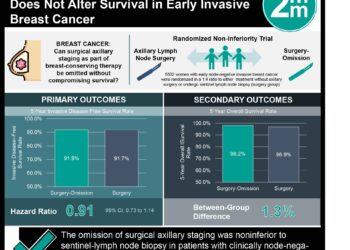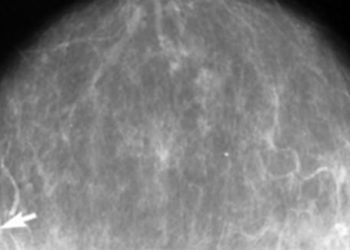Risk factors for breast cancer-associated lymphedema may be fewer than previously reported
1. In this prospective cohort study of over 600 breast cancer patients, there was no significant association between ipsilateral blood draws/injections, blood pressure measurements, or air travel with breast cancer-associated lymphedema (BCRL).
Evidence Rating Level: 2 (Good)
Study Rundown: BCRL is a well-known adverse effect of breast cancer treatment that may lead to significant functional disability. Although current national guidelines caution against frequent air travel as well as blood draws, injections and blood pressure readings to the at-risk arm to reduce the risk of BRCL, there is a paucity of evidence to support these recommendations. The purpose of this large, prospective cohort study was to evaluate the association of these aforementioned risk factors and BCRL.
The authors prospectively followed over 600 breast cancer patients for BCRL and assessed their exposures to various reported risk factors. At the conclusion of the trial, there was an increased risk of lymphedema in patients with a BMI of over 25 as well as in patients with previous history of cellulitis. However, there were no significant associations between lymphedema and ipsilateral blood draws/injections, blood pressure readings, or air travel. The results of this study support that risk factors for BCRL may be less than previous reported. These findings are strengthened by the large size and prospective design of this study. However, it should be noted that follow-up was relatively short at a median of 24 months. Furthermore, the exposures was dependent on patient history, which render the results open to recall bias. Additional long-term, longitudinal studies are needed to confirm this association.
Click to read the study in JCO
Relevant Reading: Incidence of unilateral arm lymphedema after breast cancer: a systematic review and meta-analysis
In-Depth [prospective cohort]: This was a large, prospective cohort of 632 patients diagnosed with breast cancer between 2009 and 2014 in a single institution in the United States. Overall, 20.9% of patients underwent axillary lymph node dissection (ALND), and 71.2% sentinel lymph node dissection (SLND). Patients were screened prospectively for lymphedema using bilateral arm volume measurements in regular follow-up intervals post-operatively of 3 to 7 months. During each measurement, patients completed a survey which included exposure information including number of blood draws, injections, blood pressure readings and trauma to the at-risk arm as well as number of flights and length of flight since last measurement. Episodes of cellulitis were also noted. After a median follow-up of 24 months, the cumulative incidence of BCRL was 7.72% (95% CI: 5.82 to 10.22). On multivariate analysis, the factors associated with increases in arm volume included BMI greater than 25 (P=0.024) and cellulitis (P<0.001). Blood draws (p=0.62), injections (p=0.77), trauma (p=0.08), and air travel (p=0.77) were not significantly associated with increases in arm volume.
Image: PD
©2015 2 Minute Medicine, Inc. All rights reserved. No works may be reproduced without expressed written consent from 2 Minute Medicine, Inc. Inquire about licensing here. No article should be construed as medical advice and is not intended as such by the authors or by 2 Minute Medicine, Inc.







